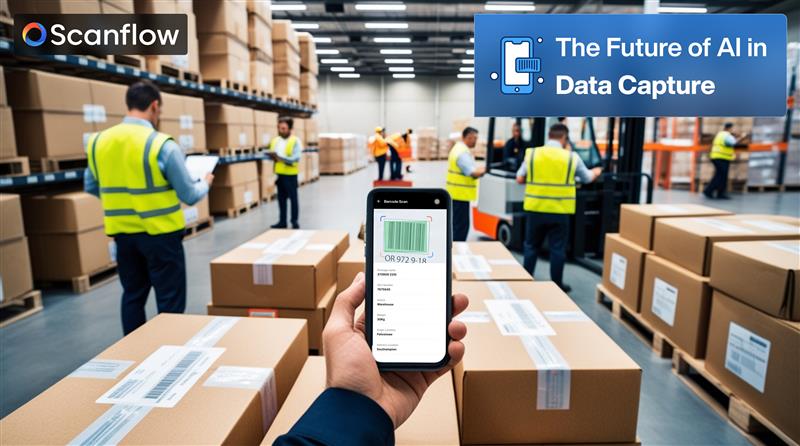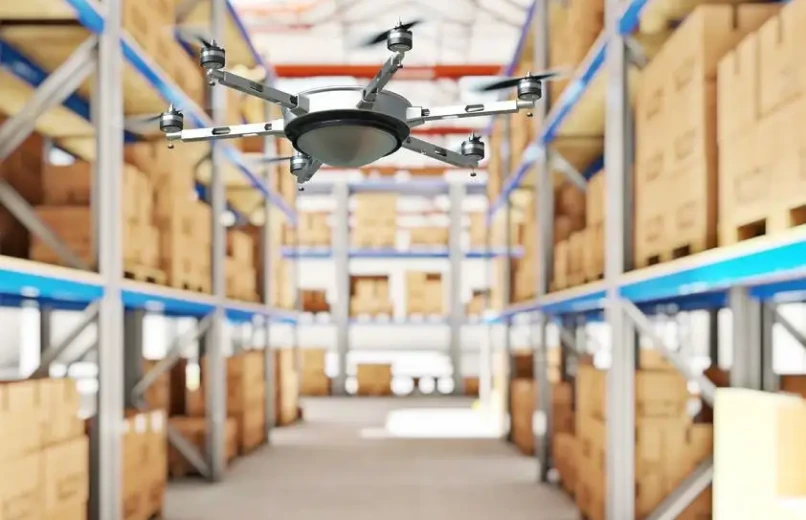Taking scanners to the Sky! All you need to know about Drone Scanning
In today’s world, drones have progressed as a technological headway that helps businesses to utili...
2 Mins read
Posted on Feb 10, 2023

In today’s fast-paced world, businesses are turning to AI for data capture to collect, process, and manage complex information with greater accuracy and speed. This technology extends beyond simple data extraction, it efficiently handles alphanumeric data like VIN plate scanning, tire sidewall numbers, serial numbers, Bar codes, QR codes etc., ensuring precision even in the most challenging […]
In today’s fast-paced world, businesses are turning to AI for data capture to collect, process, and manage complex information with greater accuracy and speed. This technology extends beyond simple data extraction, it efficiently handles alphanumeric data like VIN plate scanning, tire sidewall numbers, serial numbers, Bar codes, QR codes etc., ensuring precision even in the most challenging conditions.
Industries such as automotive, logistics, manufacturing, and retail are integrating AI visual inspection solutions and AI for data capture to streamline workflows, reduce manual errors, and enhance operational efficiency. This shift isn’t just a technological upgrade but it’s redefining how businesses capture and use data in real time.
AI is revolutionizing data capture by automating the collection of complex information across various environments. What once required manual data entry or specialized equipment can now be handled seamlessly by AI visual inspection workflows.
Key applications of AI in advanced data capture include:
VIN Plate Scanning: Essential in the automotive and logistics industries, AI quickly and accurately captures vehicle identification numbers, streamlining tracking, registration, and inventory.
Tire Sidewall Numbers: AI can extract detailed information from tire sidewalls, supporting product verification, recall management, and quality assurance in manufacturing.
Serial Number Scanning: Useful in electronics and industrial sectors, AI captures serial numbers for inventory tracking, warranty management, and equipment identification.
Alphanumeric Text Recognition: AI retrieves data from labels, machinery plates, and industrial documentation, ensuring error-free data input and reducing manual workload.
Why it matters?
AI captures data from worn, distorted, or low-visibility surfaces, ensuring accurate collection under challenging conditions. This reduces errors, enhances data consistency, and allows businesses to maintain accurate records without manual oversight.
Manual data entry is labor-intensive and prone to mistakes. AI introduces automation across industries, reducing the need for human intervention while improving accuracy and speed. This is particularly valuable in environments requiring high-volume data capture.
Benefits of AI-automated workflows include:
Faster Data Processing: AI captures and processes large volumes of data in seconds, accelerating operations in industries like logistics and automotive.
Error Reduction: AI eliminates human error by accurately reading and recording alphanumeric information, even from difficult angles or damaged surfaces.
Seamless Workflow Automation: AI integrates with existing ERP systems, warehouse management software (WMS), and supply chain platforms to automate data transfer and reporting.
Industries such as manufacturing and retail benefit significantly from automated workflows, as AI can track incoming and outgoing shipments, verify product details, and ensure smooth operational transitions.
AI doesn’t just capture data. Once collected, the data is processed, organized, and integrated with existing systems to provide a comprehensive view of business operations.
Applications of AI for data management across industries include:
Inventory Control: In warehousing and logistics, AI tracks product movement and ensures real-time updates, reducing miscounts and stock discrepancies.
Automated Audits: AI facilitates internal audits by automating the collection and verification of critical data, ensuring compliance with industry regulations.
Data Accuracy and Reporting: AI improves reporting precision by capturing real-time data across multiple touchpoints, enhancing supply chain visibility and operational transparency.
By automating data management, businesses can process vast information efficiently while maintaining accuracy, ultimately enhancing decision-making and optimizing resource allocation.
AI’s adaptability makes it invaluable across multiple sectors, where it enhances efficiency and reduces human error. Here’s how AI-driven data capture transforms different industries:
Automotive Industry: AI simplifies VIN plate scanning, improves inventory accuracy, and facilitates compliance tracking across vehicle fleets.
Logistics & Supply Chain: AI automates serial number scanning for package tracking, delivery validation, and warehouse automation, ensuring faster and more accurate logistics.
Manufacturing: AI captures tire sidewall numbers and other industrial identifiers, streamlining product lifecycle management and enhancing production efficiency.
Retail & Consumer Goods: AI supports large-scale inventory tracking and customer data management, improving efficiency in managing supply chains and retail stock.
Healthcare: AI assists in capturing device serial numbers and alphanumeric codes on medical instruments, ensuring accurate records for regulatory compliance.
The Future of AI in Data Capture
The future of AI visual inspection solutions is poised to bring even more advanced capabilities to data capture and management. With ongoing advancements, AI will offer:
Improved Recognition Accuracy: Enhanced models for capturing data from irregular surfaces, low-light environments, and damaged labels.
Integrated Systems: Seamless communication with broader digital ecosystems, including IoT devices and smart supply chains.
Scalable Automation: Greater scalability for industries handling high volumes of alphanumeric data, ensuring accuracy across diverse applications.
Conclusion: AI is Redefining Data Capture
AI is transforming the way industries handle data capture, moving beyond traditional methods to deliver faster, more accurate, and automated solutions. From VIN plate scanning in the automotive sector to serial number scanning in logistics, AI enhances efficiency and reduces human error across various touchpoints.
By integrating AI visual inspection workflows and AI for data capture, businesses can automate complex processes, improve operational accuracy, and gain real-time insights. This shift not only optimizes resource allocation but also ensures smoother, more efficient workflows across industries.
As AI continues to evolve, its applications in data capture will expand, offering smarter, more scalable solutions that drive innovation and operational excellence. Embracing these advanced technologies is no longer optional, it’s essential for businesses looking to stay competitive in a data-driven world.
To stay ahead of this curve, Explore Scanflow AI and see how it can benefit your business operations, visit – https://www.scanflow.ai/get-in-touch/
Taking scanners to the Sky! All you need to know about Drone Scanning
2 Mins read
Posted on Feb 10, 2023

This privacy policy sets out how Scanflow uses and protects any information that you give Scanflow when you use this website. Scanflow is committed to ensuring that your privacy is protected. We shall ask you to provide certain information by which you can be identified when using this website, then you can be assured that it will only be used in accordance with this privacy statement.
Scanflow may change this policy from time to time by updating this page. You should check this page from time to time to ensure that you are happy with any changes.
What We Collect
We may collect the following information:
Name and job title
Contact information including email address
Demographic information such as postcode, preferences and interests
Other information relevant to customer surveys and/or offers
What we do with the information we gather
We require this information to understand your needs and provide you with a better service, and in particular for the following reasons:
Internal record keeping.
We may use the information to improve our products and services.
We may periodically send promotional emails about new products, special offers or other information which we think you may find interesting using the email address which you have provided.
From time to time, we may also use your information to contact you for market research purposes. We may contact you by email, phone, fax or mail.
We may use the information to customize the website according to your interests.
Security
We are committed to ensuring that your information is secure. In order to prevent unauthorized access or disclosure, we have put in place suitable physical, electronic and managerial procedures to safeguard and secure the information we collect online.
How we use cookies
A cookie is a small file which asks permission to be placed on your computer’s hard drive. Once you agree, the file is added and the cookie helps analyze web traffic or lets you know when you visit a particular site. Cookies allow web applications to respond to you as an individual. The web application can tailor its operations to your needs, likes and dislikes by gathering and remembering information about your preferences.
We use traffic log cookies to identify which pages are being used. This helps us analyze data about webpage traffic and improve our website in order to tailor it to customer needs. We only use this information for statistical analysis purposes and then the data is removed from the system.
Overall, cookies help us provide you with a better website, by enabling us to monitor which pages you find useful and which you do not. A cookie in no way gives us access to your computer or any information about you, other than the data you choose to share with us.
You can choose to accept or decline cookies. Most web browsers automatically accept cookies, but you can usually modify your browser setting to decline cookies if you prefer. This may prevent you from taking full advantage of the website.
Links to other websites
Our website may contain links to other websites of interest. However, once you have used these links to leave our site, you should note that we do not have any control over that other website. Therefore, we cannot be responsible for the protection and privacy of any information which you provide whilst visiting such sites and such sites are not governed by this privacy statement. You should exercise caution and look at the privacy statement applicable to the website in question.
Controlling your personal information
You may choose to restrict the collection or use of your personal information in the following ways:
Whenever you are asked to fill in a form on the website, look for the box that you can click to indicate that you do not want the information to be used by anybody for direct marketing purposes
If you have previously agreed to us using your personal information for direct marketing purposes, you may change your mind at any time by writing to or emailing us at info@scanflow.ai We will not sell, distribute or lease your personal information to third parties unless we have your permission or are required by law to do so. We may use your personal information to send you promotional information about third parties which we think you may find interesting if you tell us that you wish this to happen. If you believe that any information, we are holding out from you is incorrect or incomplete, please write to or email us as soon as possible at the above address. We will promptly correct any information found to be incorrect.
